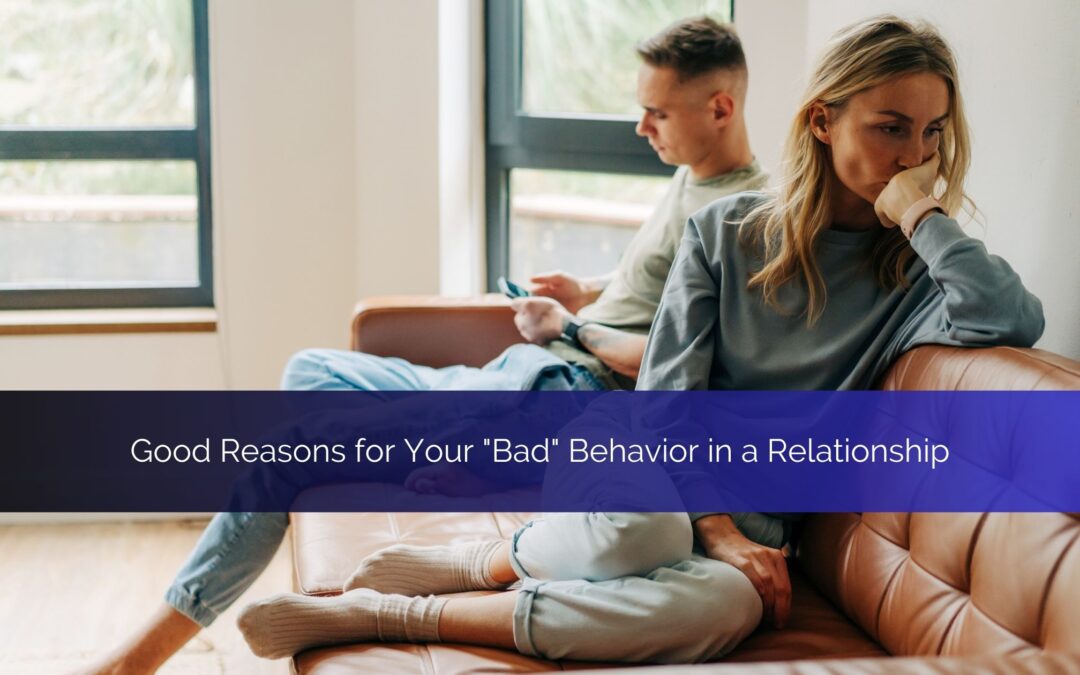Sometimes we can get down on ourselves for the choices, behaviors, and negative patterns we get into in our relationships. We wonder what’s wrong with us that we keep repeating these patterns and maybe even give up hope that things will ever change. Couples therapy can help you understand and untangle the pattern and communicate more clearly and effectively with one another. By befriending that part of you that is seen as the problem and finding compassion for it, you can start to understand its purpose, shift your perspective, and find new ways to communicate with your partner. Couples therapy can help you see that there are valid reasons why you and your partner do what you do in heated situations.

Let’s take nagging as an example. You’ve been working hard all day, tired, and tapped out. You see your partner sitting on the couch while you’re cleaning and think they don’t care about you. Your alarm bells go off, you’re in distress, and the only way you know how to affect change is to nag. When your partner sees you nagging, they start thinking that they can’t do anything right, their alarm bells go off, and in distress, they walk away. You might have needed a moment of connection with your partner to feel less alone, but because you’re in the negative cycle, your partner can’t provide that for you. The solution? Identify the underlying need so that you can articulate to your partner how you are feeling and what you are looking for to feel more seen and less overwhelmed.

Here are common strategies during communication breakdowns and their purpose:
Strategy: Getting louder or bigger, criticizing, nagging, controlling, pushing, asking questions
Purpose: What you might be trying to do is:
1) Close the distance in the relationship, get closer
- You’re trying to connect with a partner who is feeling inaccessible at the moment
- You’re thinking your partner isn’t engaged and responsive and want to know if your partner is with you as you’re talking
- You poke and ask questions because you’re anxious when your partner seems distant because that might mean the relationship is going to end
2) Fighting for the relationship to survive/creating some kind of change
- It’s an attempt to motivate change or get a response
- You’re hoping that by saying something, something will change; there is hope in pushing even if it results in a fight because at least there’s a response
- You would rather fight than suffer through silence and feel alone
3) Protect yourself
- It’s easier to focus on your partner and change their behavior than to look inward at the parts you are trying to hide, afraid that if you share them, your partner will think you’re too much and reject you
Strategy: getting quiet, minimizing or dismissing partner’s feelings, pushing for a positive outlook, withdrawing, walking away
Purpose: What might you be trying to do is:
1) Calm the relationship down/turn down the heat
- You are feeling overwhelmed and exposed and want some relief
- It’s an attempt to contain the interaction, not let it get bigger
- You think, if I shut down, everything will be okay. Things will calm down. We’ll forget about it, and everything will return back to how it was before.
2) Protect the relationship from the damage that can occur from fighting
- You learned that engagement creates escalation, so you’re always scanning for any kind of threat, and when you see it, you jump in to try and stop it before it can escalate
- Your focus is on how to limit distressing engagement and prevent escalation because if you fight too often, your fear is that it will end the relationship
3) Take space and give yourself time to figure things out
- You need to make sense of things before you can move forward
- Sometimes, you don’t know how you’re feeling or how to answer your partner. Perhaps you’ve never put into words your experience/feelings before
4) Protect yourself
- You’re worried that if your partner knew who you really are, they would think you’re not good enough and stop loving you

Meet the author: Dr. Dorothy Moon
Learn More about Dorothy’s approach to therapy
Photo Credits:
Photo by Eric Ward on Unsplash
Photo by Renate Vanaga on Unsplash
Photo by Dương Hữu on Unsplash





